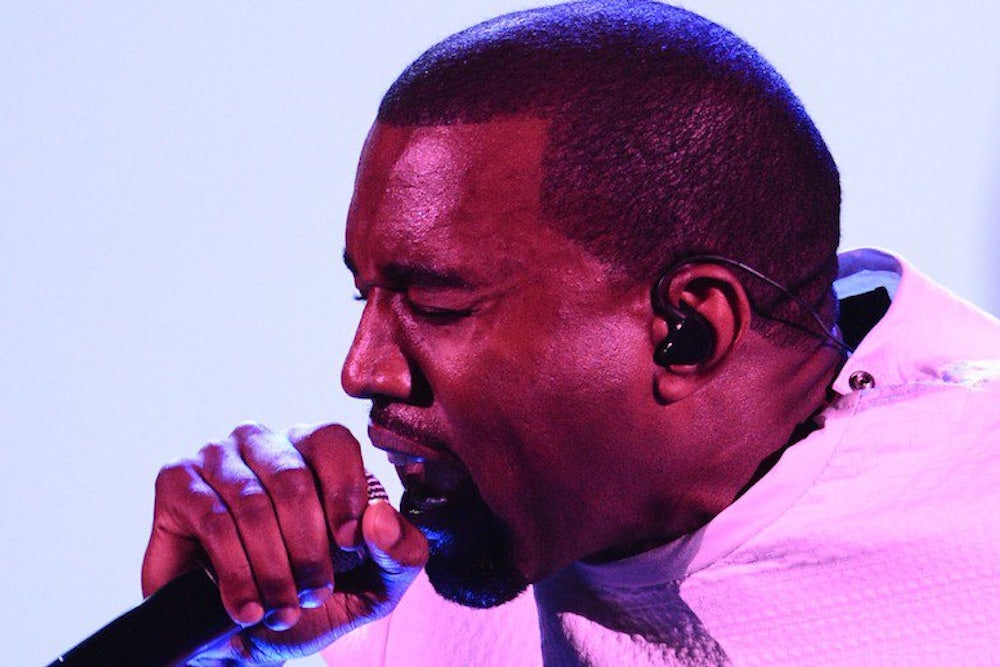A better title would be Yeeweh. With the name of his new album, Yeezus, Kanye West reminds us unnecessarily of his longstanding delusions of divinity—a not-so-beautiful, but dark and twisted fantasy that has been integral to his persona since the time of his early single, "Jesus Walks," in 2005. Then, he posed for the cover of Rolling Stone in a crown of thorns. This week, with nearly as much audacity but considerably less flair, he has not only named his latest release for a mash-up of the name of the Christian deity and his own nickname, Yeezy; he has included on the album a song called "I Am a God." But the divine being he suggests in the raging music of Yeezus is not a tragic savior, crucified; it is a wrathful ancient God—vain and petulant, unforgiving, insatiable. Or worse: a God who would have all lesser creatures on their knees before him, but not just for prayer.
Kanye West is neither the first nor the biggest jackass in American music, to use President Obama's term for him. As we know from the history of rant tapes, the jazz drummer and bandleader Buddy Rich could be a despot on the band bus, and Paul Anka, the dean of old Vegas, could act like a maniac when he didn't get his way. Ego and power lust (or, for that matter, the lust for lust) are not privileges exclusive to Kanye. What distinguishes him is the stylish way in which he brings his maniacal vainglory to his work. His music is all about being a jackass, and its sheer arrogance, its open monstrosity, gives it much of its force. Kanye's music derives its power from its exultation in power itself.
With Yeezus, his sixth album, Kanye gives his tyrannical indifference its bluntest form. It's a wholly unapologetic work of music—spiky, severe, and often difficult to take. "How much do I not give a fuck? Let me show you right now," Kanye snaps on the opening track, "On Site," and the album is relentless in the presentation of its evidence.
Musically, Yeezus is fearsomely raw, spare, and erratic, heavily influenced by Chicago house music and its mutation, European electronica. Kanye, astutely, brought Daft Punk in as collaborators, and the dark, woozy sound of their synthesizers opens the album. There are abrupt shifts in mode, with disparate segments of seemingly disconnected tracks spliced one after another disruptively, as if Kanye (or Rick Rubin, who served as one of the project's co-producers) put all the materials for the album in a playlist with a "mess up" mode.1 The effect is effectively, if a bit self-consciously, Cagean. Not a track is danceable. Yeezus is music for listening, made difficult.
Lyrically, Yeezus is mostly a recapitulation of Kanye's favorite theme: his own wonderfulness. There are some moments of vintage Kanye cleverness, most notably in "I Am a God," with the great, already over-tweeted couplet, "Hurry up with my damn massage, hurry up with my damn ménage." In "New Slaves," Kanye memorably rhymes "followers" and "swallower" with a panache that Noel Coward might have envied. Still, most of the words feel almost like imitations of Kanye West, and two of the album's notable attempts at political and social criticism, "Black Skinhead" and "Blood on the Leaves," fall quickly apart. The first starts as a criticism of white resentment of black prosperity, but ends up as a celebration of Kanye's magnificence; and the latter, built ingeniously over a sample of Nina Simone's searing rendition of the anti-lynching anthem "Strange Fruit," devolves quickly into a story about a love triangle between the singer, his wife, and his mistress.
The album is only 40 minutes, but by the end, Kanye seems indifferent to even himself. In the last track, "Bound 2," he blurts out, "After all these long-ass verses, I'm tired, you tired, Jesus wept." Even the God of Kanye's delusions was too bored to be angry anymore.
I wrote about Rubin and Kanye for this magazine in 2006.
